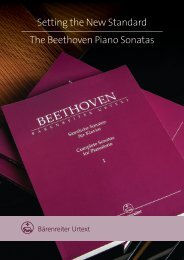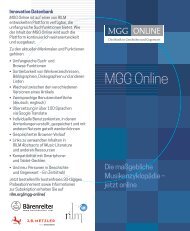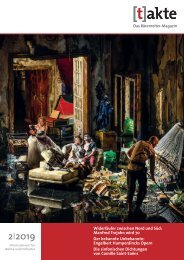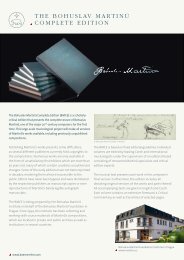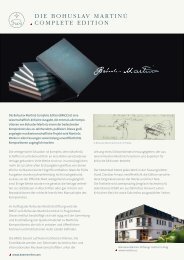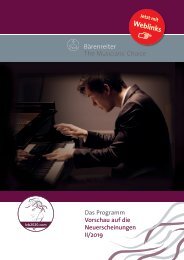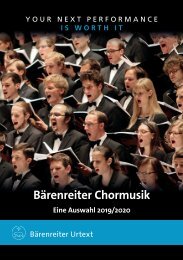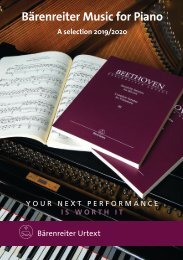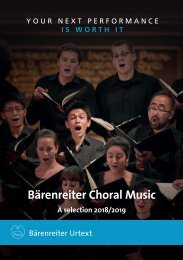SPA314_Czech Music_2017-18_web_new
You also want an ePaper? Increase the reach of your titles
YUMPU automatically turns print PDFs into web optimized ePapers that Google loves.
BÄRENREITER PRAHA<br />
H 5094<br />
BÄRENREITER PRAHA<br />
H 5095<br />
SOLO VOICE<br />
SOLO VOICE<br />
Eben Petr<br />
(1929–2007)<br />
Songs for a Lute (Písně k loutně)<br />
for voice and lute / guitar<br />
to words of medieval and<br />
Renaissance love poetry<br />
(in original languages)<br />
(Cz/Eng/Fr/Ger)<br />
a small pendant to the cycle Six<br />
Songs of Love, suitable for an<br />
amateur singer and guitarist in<br />
one<br />
Rev. by J. Tichota<br />
H 6300<br />
Foerster Josef Bohuslav<br />
(<strong>18</strong>59–1951)<br />
Erotikon Op. 23<br />
Four songs for high voice<br />
and piano<br />
(Cz/Ger)<br />
H 7849<br />
Hanuš Jan<br />
(1915–2004)<br />
Umbrella from Piccadilly<br />
(Deštník z Piccadilly) Op. 103<br />
Three songs for bass and large<br />
orchestra<br />
to words by Jaroslav Seifert (Cz)<br />
(with literal English and German<br />
translations of the lyrics)<br />
H 7439 study score ♦<br />
Janáček Leoš<br />
(<strong>18</strong>54–1928)<br />
Four Ballads (Čtyři balady)<br />
for medium voice and piano<br />
to words of folk poetry<br />
(Cz/Ger)<br />
Rev. by J. Trojan<br />
H 6497<br />
Moravian Folk Poetry in Songs<br />
(Moravská lidová poezie<br />
v písních)<br />
for voice and piano<br />
(Cz/Ger)<br />
H 4570<br />
Silesian Songs (Slezské písně)<br />
for low voice and piano<br />
to words from a collection of folk<br />
songs by Helena Salichová<br />
(Cz)<br />
Rev. by B. Štědroň<br />
H 1403<br />
Janáček Leoš<br />
(<strong>18</strong>54–1928)<br />
NEW 2016<br />
The Diary of One Who<br />
Disappeared (Zápisník<br />
zmizelého)<br />
for tenor, alto, three female<br />
voices and piano<br />
to words by Ozef Kalda<br />
(Cz/Eng/Ger)<br />
Urtext / Ed. J. Zahrádka<br />
BA 9575 score<br />
(replaces H 935)<br />
arrangement for chamber<br />
orchestra by M. Štědroň and<br />
M. Orson Štědroň available<br />
on hire<br />
Janáček's intimate chambermusic<br />
drama about the passionate<br />
love of a simple farm boy<br />
6<br />
<br />
Tenore<br />
<br />
Pianoforte<br />
ne - sla sa<br />
lithe as a<br />
leicht schritt sie<br />
sf<br />
<br />
<br />
Andante (q . = 76)<br />
<br />
6<br />
16<br />
<br />
Ich<br />
ja - ko laň,<br />
deer was she,<br />
wie ein Reh,<br />
mf<br />
Po - tkal sem<br />
One day I<br />
traf ei - ne<br />
°<br />
I<br />
*)<br />
for a beautiful gypsy girl is one<br />
of his great vocal masterpieces.<br />
This cycle of 22 songs for tenor<br />
(an alto and three female voices<br />
are added in three numbers)<br />
was composed on a setting of<br />
poems that were published<br />
anonymously. It was not until 80<br />
years later that their author was<br />
identified as the regional poet<br />
and writer Ozef Kalda. The cycle<br />
also contains theatrical elements,<br />
such as the alto entrance and exit<br />
cues and lighting effects.<br />
Composed in 1917–19, the Diary<br />
was premiered in Brno in 1921<br />
from a manuscript prepared<br />
by Gustav Homola. The same<br />
manuscript served as a basis for<br />
the first edition which was issued<br />
by the Brno publisher Oldřich<br />
Pazdírek in 1921 as well as for this<br />
current first Urtext edition.<br />
● First Urtext edition<br />
● Detailed preface (Cz/Eng/Ger)<br />
with <strong>new</strong> information on the<br />
genesis of the work and critical<br />
commentary (Eng) by the editor<br />
● Numbers IX to XI which include<br />
the alto and three female voices<br />
behind the scene also available<br />
online in a PDF form on our<br />
<strong>web</strong>site for download<br />
accel.<br />
mla - dou<br />
met a<br />
jun - ge Zi<br />
ci - gán - ku,<br />
Gyp - sy girl,<br />
- geu - ne - rin,<br />
6<br />
16 <br />
pp<br />
2 2 2 2 2 2<br />
6<br />
16 <br />
<br />
<br />
<br />
<br />
<br />
<br />
<br />
<br />
4 4 4<br />
přes<br />
black<br />
schwarz<br />
pr<br />
hair<br />
auf<br />
Leoš Janáček<br />
sf<br />
<br />
<br />
<br />
<br />
<br />
<br />
<br />
<br />
<br />
<br />
<br />
<br />
<br />
<br />
<br />
2 2 2 2<br />
<br />
<br />
<br />
<br />
<br />
<br />
<br />
<br />
<br />
<br />
<br />
<br />
sf<br />
<br />
<br />
-<br />
sa<br />
lay<br />
der<br />
cresc.<br />
2 2 2 2<br />
<br />
<br />
<br />
<br />
<br />
<br />
<br />
<br />
<br />
<br />
<br />
<br />
<br />
<br />
Kalabis Viktor<br />
(1923–2006)<br />
Five Romantic Songs about<br />
Love to Words by R. M. Rilke<br />
(Pět romantických písní o lásce<br />
na slova R. M. Rilka) Op. 38<br />
for high voice and piano<br />
(Ger/Cz)<br />
H 7841<br />
Kaprálová Vítězslava<br />
(1915–1940)<br />
Love Carol (Koleda milostná)<br />
for medium / high voice and<br />
piano (together with Love<br />
Carol by Bohuslav Martinů)<br />
(Cz/Ger)<br />
Ed. I. Popelka<br />
H 5585<br />
Kopelent Marek<br />
(*1932)<br />
Excited Song (Zjitřený zpěv)<br />
for baritone and brass quintet<br />
(2 trumpets, French horn,<br />
2 trombones)<br />
to words by Josef Hora<br />
(Cz)<br />
H 7791 score with parts<br />
Martinů Bohuslav<br />
(<strong>18</strong>90–1959)<br />
Four Songs on <strong>Czech</strong> Folk Poetry<br />
(Čtyři písně na slova české lidové<br />
poezie) H. 282 bis<br />
for voice and piano<br />
(Cz/Ger/Eng)<br />
Ed. A. Březina<br />
H 7809<br />
Love Carol (Koleda milostná)<br />
H. 259<br />
for medium / high voice and<br />
piano (together with Love Carol<br />
by Vítězslava Kaprálová)<br />
(Cz/Ger)<br />
Ed. I. Popelka<br />
H 5585<br />
New Chap-Book (Nový Špalíček)<br />
H. 288<br />
for voice and piano<br />
Eight songs on Moravian folk<br />
poetry<br />
(Cz/Ger)<br />
Ed. I. Popelka<br />
H 6132<br />
Bohuslav Martinů<br />
LIEDER AUF EINER SEITE<br />
SONGS ON ONE PAGE<br />
Canto e Piano<br />
Songs on One Page (Písničky<br />
na jednu stránku) H. 294<br />
for high voice and piano<br />
Seven songs on Moravian folk<br />
poetry<br />
(Cz/Eng)<br />
H 5094<br />
orchestral arrangement by<br />
J. Teml available on hire<br />
Bohuslav Martinů<br />
LIEDER AUF ZWEI SEITEN<br />
SONGS ON TWO PAGES<br />
Canto e Piano<br />
Songs on Two Pages (Písničky<br />
na dvě stránky) H. 302<br />
for high voice and piano<br />
Seven songs on Moravian folk<br />
poetry<br />
(Cz/Eng)<br />
H 5095<br />
Two Songs to the Text of Negro<br />
Folk Poetry (Dvě písně na texty<br />
negerské poezie) H. 232 bis<br />
for voice and piano<br />
(Cz/Ger)<br />
Ed. I. Popelka<br />
H 5988<br />
Michna Adam Václav<br />
z Otradovic<br />
(1600–1676)<br />
NEW <strong>2017</strong><br />
The <strong>Czech</strong> Lute (Loutna česká)<br />
A collection of 13 songs for two<br />
voices, two violins and basso<br />
continuo<br />
to words by the composer (Cz)<br />
Ed. P. Daněk<br />
H 8040 parts with particell<br />
in slipcover<br />
To appear in December <strong>2017</strong><br />
The <strong>Czech</strong> Lute is a 1653 collection<br />
of 13 strophic songs. Each<br />
of them is introduced by an<br />
instrumental ritornel; the cycle<br />
represents the first occurrence<br />
of ritornel songs in <strong>Czech</strong>.<br />
Until recently the notation of<br />
the instrumental ritornels was<br />
unknown because the parts of<br />
the first and second violins were<br />
lost. The discovery of the part of<br />
the first violin in January 2014<br />
by the editor of this edition was<br />
unique accomplishment that<br />
enabled the first reliable reconstruction<br />
of the work with the<br />
help of the basso continuo part,<br />
even though the notation of the<br />
second violin remains missing.<br />
The premiere CD recording of<br />
this authentic version of The<br />
<strong>Czech</strong> Lute was created by Adam<br />
Viktora and Ensemble Inégal for<br />
Nibiru in 2015.<br />
● Most famous song collection<br />
of the <strong>Czech</strong> Baroque<br />
● Reconstruction of the work<br />
based on the <strong>new</strong>ly discovered<br />
part of the first violin<br />
● First-ever edition of<br />
instrumental ritornels with<br />
the reconstructed part of the<br />
second violin and the fully<br />
notated basso continuo by<br />
Adam Viktora<br />
● Preface (Cz/Eng/Ger) and<br />
critical commentary (Eng)<br />
by the editor<br />
4 4<br />
4<br />
4<br />
♦ Performance material<br />
° °<br />
available on hire<br />
11<br />
<br />
<br />
<br />
<br />
<br />
<br />
<br />
<br />
<br />
čer - né<br />
le - lí - ky a o - či bez dna zhlaň.<br />
64 on her shoul - ders, her eyes were deep as the<br />
see.<br />
65<br />
Brust die Zöp - fe, das Au - ge ein finst - rer<br />
See.









